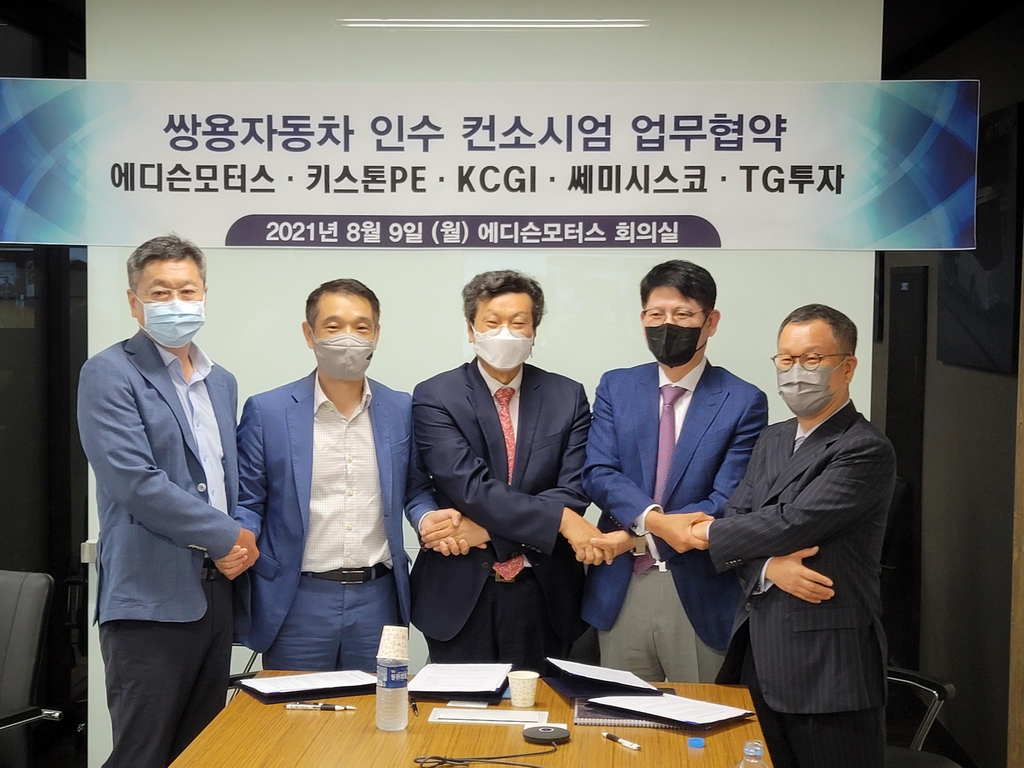- California Assembly OKs highest minimum wage in nation
- S. Korea unveils first graphic cigarette warnings
- US joins with South Korea, Japan in bid to deter North Korea
- LPGA golfer Chun In-gee finally back in action
- S. Korea won’t be top seed in final World Cup qualification round
- US men’s soccer misses 2nd straight Olympics
- US back on track in qualifying with 4-0 win over Guatemala
- High-intensity workout injuries spawn cottage industry
- CDC expands range of Zika mosquitoes into parts of Northeast
- Who knew? ‘The Walking Dead’ is helping families connect
Another private equity fund joins consortium to acquire SsangYong Motor
Another homegrown equity fund renowned for its failed attempt to take over the holding company of the country’s largest airline last year has joined a consortium to acquire SsangYong Motor Co., the consortium said Monday.
The Korea Corporate Governance Improvement (KCGI) fund came aboard the consortium that Edison Motors Co. formed with the Keystone Private Equity Co. and two other financial investors to buy the debt-ridden carmaker at an upcoming auction.
“We decided to join the consortium as we agree with Edison Motors Chairman Kang Young-kwon’s vision to transform SsangYong into an electric vehicle-focused carmaker in line with changes in the automobile market,” KCGI CEO Kang Sung-boo said during an online press conference.
SsangYong executives and employees must not stage any strikes and must fully cooperate in improving production efficiency until the company turns around, Edison Chairman Kang said, adding Edison is the right company to revive SsangYong as it has expertise in producing electric commercial vehicles.
On July 30, nine companies, including the Edison-led consortium, U.S.-based Cardinal One Motors, and SM Group, whose businesses range from construction to auto parts manufacturing, submitted letters of intent to take over SsangYong.

In December, a Seoul court dismissed the injunction filed by the KCGI against Hanjin KAL Corp.’s stock sales meant to fund its affiliate Korean Air Lines Co.’s takeover of smaller rival Asiana Airlines Inc.
The KCGI brought the issue to the court a month earlier, arguing that the share sale to the designated party will damage the holding firm’s shareholder value.
The SUV-focused carmaker and its lead manager EY Hanyoung accounting firm plan to conduct preliminary due diligence on the companies that pass an initial screening process by the end of August. They aim to select a preferred bidder in September.
It is estimated that up to 1 trillion won (US$874 million) is needed to take over the debt-laden SsangYong.
In April, SsangYong was placed under court receivership for the second time after undergoing the same process a decade earlier. Its Indian parent Mahindra & Mahindra Ltd. failed to attract an investor due to the prolonged COVID-19 pandemic and its worsening financial status.
Court receivership is one step short of bankruptcy in South Korea’s legal system. In receivership, the court will decide whether and how to revive the company.
China-based SAIC Motor Corp. acquired a 51 percent stake in SsangYong in 2004 but relinquished its control of the carmaker in 2009 in the wake of the 2008-09 global financial crisis.
In 2011, Mahindra acquired a 70 percent stake in SsangYong for 523 billion won and now holds a 74.65 percent stake in the SUV-focused carmaker.
KPMG Samjong Accounting Corp., the auditor of SsangYong, declined to give its opinion on the carmaker’s annual financial statements for the year 2020.
SsangYong could be delisted if its accounting firm again refuses to offer an opinion on the company’s annual performance for the following year after the one-year period.
From January to July, its sales fell 15 percent to 48,229 autos from 56,846 during the same period of last year. Its lineup consists of the Tivoli, Korando, Rexton and Rexton Sports SUVs.
In self-help measures, SsangYong’s 4,700 employees began to take two-year unpaid leave in rotation on July 12 while accepting an extension of a cut in wages and suspended welfare benefits until June 2023.
The company also plans to sell its current Pyeongtaek plant, 70 kilometers south of Seoul, in three to five years and build a new factory to focus on electric vehicles in the same city.











